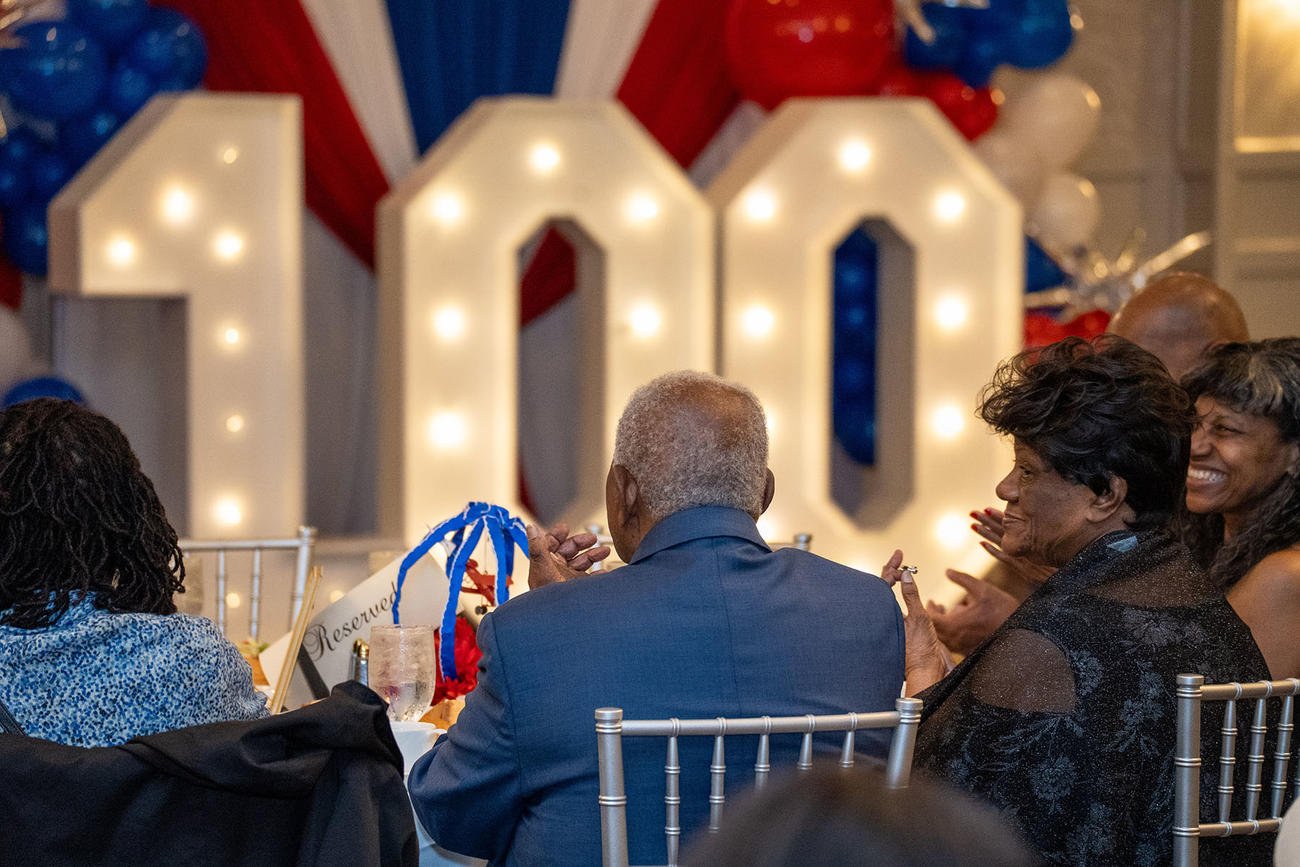
When Eugene Richardson joined the Army in 1944, it was segregated, and no Black man had ever served as a pilot in the military. Still, Richardson wanted to be a pilot.
He knew that “things would be better in the future. They’re not always going to be as it were at that particular moment,” Richardson said.
Richardson and nearly 1,000 others later attended pilot training in Tuskegee, Alabama, helping desegregate the military and becoming members of the 332nd Fighter Group and the 477th Bombardment Group of the United States Army Air Forces. The elite group of African American military pilots and airmen, famously known as the Tuskegee Airmen, earned praise for their combat record while protecting American bombers during World War II.
On Sept. 18, Richardson, who had briefly lived in Camden, celebrated his 100th birthday in Springfield, Pennsylvania, surrounded by over 100 people he had inspired throughout his lifetime.
“I’m really amazed that I was the one involved with that, but I’m very proud of it,” he said in reference to his service.
Richardson was born in Cleveland, Ohio, in 1925, where he said his love of planes and desire to be an airman blossomed at the age of 5 after he watched Black stunt fliers at an airshow, according to the Greater Philadelphia Chapter of Tuskegee Airmen, Inc. Later, his family moved to Toledo, and then to Camden, where his father had accepted a position as a church minister.
Richardson told CBS Philadelphia that he and his younger brother would watch Navy planes take off from Airport Circle in Camden as teens.
Before 1941, the Army was segregated due to racist Jim Crow laws, according to the National WWII Museum in New Orleans. But in 1941, the military established the Tuskegee Airmen Air Force program at the Tuskegee Army Air Field in Alabama, where recruits were trained to fly single- and twin-engine planes and given other military instruction to prepare them for service. The airmen had “one of the lowest loss records of any escort group,” according to a National WWII Museum report.
Richardson never saw combat because the war in Europe ended two months after he was commissioned in March 1945, according to the Greater Philadelphia Chapter of Tuskegee Airmen, Inc. In 1948, former President Harry S. Truman signed an Executive Order fully integrating the military.
According to CBS Philadelphia, in 2007, former President George W. Bush presented the Tuskegee Airmen with the Congressional Gold Medal, Congress’s highest civilian honor awarded to individuals, groups or institutions for distinguished achievements or contributions. Richardson, other airmen and widows received bronze replicas of the medals, the backs of which read, “Outstanding Combat Record. Inspired Revolutionary Reform In The Armed Services.”
Richardson told the Greater Philadelphia Chapter of the Tuskegee Airmen, Inc., that “The performance of Black pilots in World War II … proved that high levels of performance weren’t the province of guys with light skin.”
After service, Richardson continued to inspire others, becoming a teacher and then a principal in Philadelphia.
Shanda Taylor Boyd, 62, one of the attendees at Richardson’s birthday party, was one of the first females to enroll at Valley Forge Military Academy in Wayne, Pennsylvania.
She said the Tuskegee Airmen inspired her.
“It means miracles happen and that we have hope,” said Taylor Boyd, of Coatesville, Pennsylvania.
In 1985, Taylor Boyd received an award for academic excellence and Richardson pinned the pin on her. At the time, she didn’t realize that Richardson was a Tuskegee Airman.
“He’s my personal hero,” Taylor Boyd said.
Melvin Payne, president of the Greater Philadelphia Chapter of Tuskegee Airmen, Inc., also admires Richardson.
Payne joined the chapter 25 years ago, where he met Richardson. Richardson has been a mentor to Payne since then.
Payne said Richardson taught him “perseverance, professionalism and preparedness.”
“I’m one of the most blessed people in the world to get to live, walk and talk with living history,” Payne said.
Meanwhile, Richardson said he has learned a lot in the 100 years he has been alive. He said the best piece of advice he has for people is to “have faith in yourself and see yourself as doing something bigger and better.”
© 2025 Advance Local Media LLC.
Visit nj.com.
Distributed by Tribune Content Agency, LLC.
Related: How Jesse Owens’ Olympic Teammate Kept the Tuskegee Airmen Safe During World War II
Story Continues
© Copyright 2025 nj.com. All rights reserved. This material may not be published, broadcast, rewritten or redistributed.
